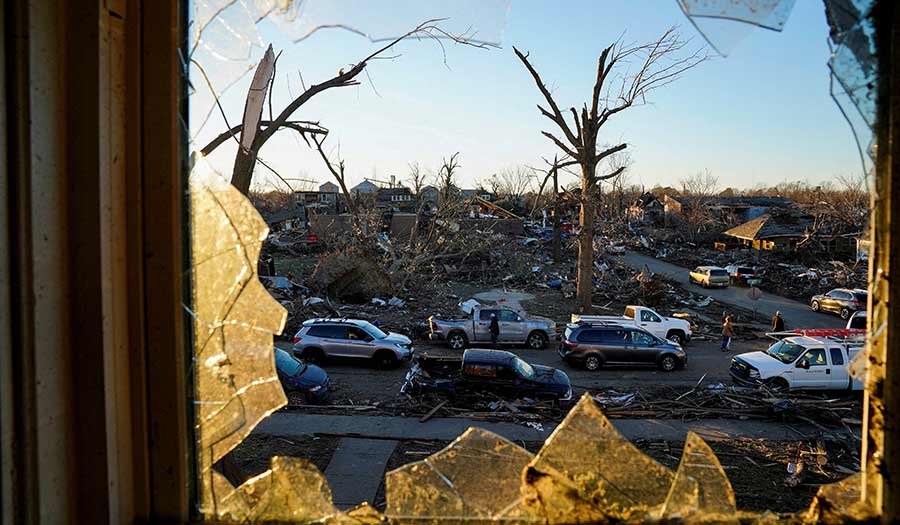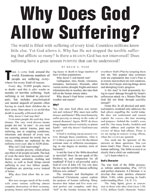 Reuters/Cheney Orr
Reuters/Cheney Orr
Article
In the wake of a deadly tornado outbreak in the United States, people are left wondering whether a higher power cares or even exists.
Learn the why behind the headlines.
Subscribe to the Real Truth for FREE news and analysis.
Subscribe NowAs the sun set at 5 p.m. on December 10 in Paducah, Kentucky, National Weather Service staff were tracking a supercell storm and ready to send tornado warnings across the state. Over 200 miles away in Mayfield, workers at a candle factory were clocking in for overtime shifts to keep up with Christmas demand and earn bonus pay.
Just 30 minutes later, employees heard the faint wail of sirens. Cellphones lit up with severe weather alerts. Following the company’s emergency protocols, staff went into a hallway designated as a storm shelter.
Several minutes went by with no storm in sight. Employees trickled back to work. Some, like Chelsea Logue, who arrived to start her shift as co-workers returned to the plant floor, did not think there was much to worry about.
“I thought it would be a rainstorm,” she said.
At 9 p.m., sirens sounded again. This time, alerts from the National Weather Service were dire, telling people in Mayfield to “shelter immediately!” as a spotted violent tornado barreled toward the area. Workers, including team-leader Autumn Kirks and her boyfriend, Lannis Joe Ward, who was a line leader at the plant, scrambled back to the hallway.
Twenty-seven minutes later, there was an eerie silence. Lights flickered, “then all of a sudden you hear just crumbling, and it’s like the whole world is just falling down around you,” Ms. Kirks said. The building collapsed as deafening winds thrashed concrete blocks and steel frames around.
Then it went silent.
Ms. Kirks saw sky and lightning where a wall had been, and her boyfriend—who was just 10 feet away when they ducked for cover—had vanished.
“I remember taking my eyes off of him for a second, and then he was gone,” she said.
Later, she got the terrible news. He had been killed in the storm.
Mr. Ward was one of 90 lives lost that night during an unprecedented powerful December outbreak of tornadoes that ripped through six U.S. states. The one that hit the Mayfield candle factory was the strongest and most devastating in Kentucky history, leaving a 165-mile trail of death and destruction, demolishing homes, leveling businesses and setting off a scramble to find survivors beneath the rubble.
The next morning revealed scenes of utter destruction across Mayfield. At the candle factory, layers of steel and cars 15 feet deep were on top of what used to be the roof. An aerial view of the plant showed concrete footprints decorated like confetti with twisted metal and shredded drywall and insulation. Rescuers had to crawl over the dead to get to the living at a disaster scene that smelled of scented candles. Elsewhere, homes were flattened or missing roofs.
For many survivors like Wes Fowler, who rode out December’s storm in a tunnel under the church he pastors, there were no answers for the devastation. “My little girl asked me, ‘Why would God let this happen?’”
While Mr. Fowler said he believes God did allow the tornado to happen, he had no answer as to why the western Kentucky community where he was baptized, grew up and chose to raise his family was not spared from the storms.
“I had to look at my little 8-year-old girl, who looks to me for answers,” he said, “and I had to say…‘I don’t know. I don’t know.’”
Each time a natural disaster brings untimely death and destruction, people ask: If God is all-powerful, why did He let it happen? And if the Almighty is good, why does He allow such awful tragedies? Or, as a USA Today piece following the Moore, Oklahoma, twister in 2013 put it, “How can a vicious tornado kill kids when God is good?”
These are all questions worthy of straightforward answers.
Searching for Meaning
Often, deadly catastrophes push survivors to stop believing in God altogether. In his 2020 book Tornado God, Peter Thuesen argued that disasters should make us question our concepts of a heavenly Being and His attributes.
According to an internet review prior to its release, the author asked, “if a god is directly responsible for both the existence and the path of a tornado, that god is acting according to something that in no way resembles the standard Christian conception of ‘right’ and ‘wrong.’ And if a god isn’t directing the tornado but merely watches while it kills the innocent, then is that god worthy of worship every Sunday? And if that god isn’t even watching, how is the situation of those faithful functionally any different than atheism?”
These questions are based on three foundations of Christian belief: God is all-knowing, all-powerful and all-good. Each time calamity takes lives indiscriminately, those pillars can seem to stand on sand. Believers have a hard time accepting that any person who sees what is happening and has the power to stop it does not.
Yet rejecting the existence of God is not the answer to why an omnipotent and omniscient being allows suffering. But, again, you should not accept “we cannot know” for an answer.
Some of the Bible’s authors explored similar lines of thinking. Ancient Israelite King Solomon, for instance, wrote Ecclesiastes while grappling with troubling observations.
In it, he wrote: “All things have I seen in the days of my vanity: there is a just man that perishes in his righteousness, and there is a wicked man that prolongs his life in his wickedness” (7:15).
Through his reign, the king found that some of those who obeyed and trusted God were not any more successful than those who did not. Instead, “All things come alike to all” (9:2) and “time and chance happens to them all” (9:11).
Solomon simply had to conclude that “man also knows not his time: as the fishes are taken in an evil net, and as the birds that are caught in the snare; so are the sons of men snared in an evil time, when it falls suddenly upon them” (vs. 12).
This reality drove him to despair, told through the king’s refrain throughout the book, “all is vanity and vexation of spirit.” We could suppose he was thinking: Why would an all-knowing, all-powerful and loving God simply let people needlessly suffer and unexpectedly die?
Yet Solomon did not leave this question unresolved.
The Crucial Lesson
Let’s go back to Ecclesiastes, to the most oft-quoted passage. Chapter 3 starts: “To everything there is a season, and a time to every purpose under the heaven…” (vs. 1).
The following verses list the highs and lows of life. A time to be born, a time to die. To plant and pluck. To kill and heal. Break down and build up. Weep and laugh. Mourn and dance. Get and lose. Love and hate.
These dichotomies are more than poetic drivel. They paint a picture of life—both good and bad—and show both are inevitable parts of our existence. Solomon made clear later in the book that no one is immune from experiencing both sides of the spectrum.
Notice in chapter 7: “In the day of prosperity be joyful, but in the day of adversity consider: God also has set the one over against the other, to the end that man should find nothing after him” (vs. 14).
In simple English, every person regardless of religious belief will experience good and bad. The person who is born will die. In the same way, the person who dances will mourn. He who laughs will weep. Getting is followed by losing.
Even more simply stated: Tragedy is inevitable.
Each one of us—whether religious or not—cannot control when or whether suffering comes. But we can and should control how we react to it when it does. Solomon said in dark times we should consider.
What does that mean? Ecclesiastes 7:2 makes it clear beyond doubt: “It is better to go to the house of mourning, than to go to the house of feasting: for that is the end of all men; and the living will lay it to his heart.”
Realize what you just read.
Instead of dismissing the death and destruction—or dismissing God’s existence—following tragedies such as the tornadoes in the Central U.S., we are best served to reflect on what happened there. Those 90 deaths, and the despair and fear associated with them, should send a message to those who remain alive. Our hearts should go out to the survivors. But we should also carefully consider that life is temporary and fragile, and therefore live it a certain way.
Ecclesiastes states anyone sobered by reality, who experience “sorrow” and “sadness of the countenance,” makes their “heart better” (vs. 3).
This does not mean God wants us to be perpetually unhappy, nor is life equal parts prosperity and adversity. The Bible speaks much more about how to make the most of your life.
But God has “appointed unto men once to die” (Heb. 9:27), giving each person a limited space of time to learn and experience from times of adversity. He wants us to make the most of life.
Make no mistake. God does not enjoy punishing people. He says in Ezekiel 18:32, “I have no pleasure in the death of him that dies.” The Bible says God Himself suffers through millennia of human misery. II Peter 3:9 states that the “Lord is not slack concerning His promise, as some men count slackness; but is longsuffering to us-ward, not willing that any should perish, but that all should come to repentance.” I Timothy 2:4 further states that God would “have all men to be saved.”
Ultimately, God wants to bring good to everyone who grows. Revelation shows a glimpse: “God shall wipe away all tears from their eyes; and there shall be no more death, neither sorrow, nor crying, neither shall there be any more pain: for the former things are passed away” (21:4).
Of course, this still leaves many unanswered questions. Why does God make human beings to suffer at all if He does not like it Himself? Why even allow pain if He plans to take it away in the end? How can you know for sure He really exists?
These are tough questions. Yet the Bible itself states everyone should be pondering them as they endure the adversity life brings.
Those asking these questions owe it to themselves to find the answers. To help you, go to our literature library at rcg.org. You will notice many of the titles are questions: Why Do You Exist?, Does God Exist? and Why Does God Allow Suffering?
While these titles represent the greatest questions afflicting mankind, the pages inside will guide you to the Bible’s plain answers.



